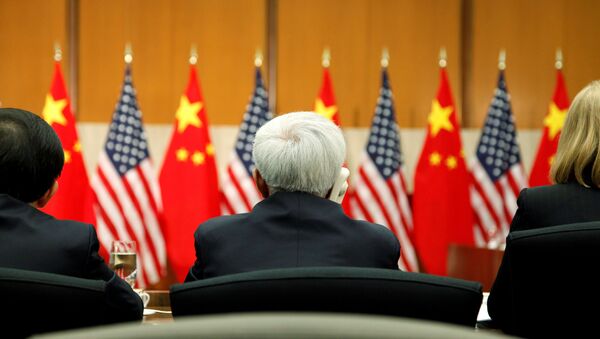Following a phone conversation between Trump and Chinese President Xi Jinping in early November, the two leaders agreed to hold a meeting on the sidelines of the G20 summit in Argentina.
The highly anticipated meeting between Trump and Xi could produce a bilateral agreement on trade related issues and help reduce trade frictions that have escalated over recent months, after the Trump administration slapped steep tariffs on almost half of annual Chinese exports to the United States, which were followed by reciprocal moves by China.
READ MORE: US, China Mull Deal to Ease Tariffs in Exchange for Trade Talks — Reports
During his phone conversation with Trump, Xi expressed his willingness to meet with the US president during the G20 summit and further exchange views on bilateral ties and other major issues, according to a statement from the Chinese Foreign Ministry.
Trump told the Wall Street Journal this week that it was "highly unlikely" for him to accept Beijing's request to delay or suspend increasing the tariff rate from 10 percent to 25 percent of the $200 billion of Chinese goods by January 1, 2019. He also mentioned that the United States could put tariffs on another $267 billion of Chinese imports.
At the same time, top White House economic adviser Larry Kudlow said the Trump administration was communicating with the Chinese government at all levels, in preparation for the high-stake meeting.
Investment Dilemma
"It’s impossible for us to know the real economic conditions in China. If you only read the publicized economic data, the difference [from the real situation] is massive. It’s difficult for us to make an accurate assessment. They [Chinese government advisers] can only use the economic difficulties the nation faces as excuses to try to convince the Chinese leadership to stop continued confrontation against the United States," Ding Xueliang, director of the Institute for China's Overseas Interests, Shenzhen University, told Sputnik.
The scholar pointed out that steep US tariffs did not only hurt export-oriented companies in China, but also, as they led to a full-fledged trade war, had a negative impact on foreign investors’ confidence in investing in the Chinese market.
"The US-China trade war can seriously impact the confidence among global investors in the Chinese market. The confidence can dictate whether those investors are still willing to commit to large projects in China. A few months [after the trade war started], this trend is already very clear. If you do an honest survey in China today, it’s very rare to find a company that is willing to commit to a significant investment in China, because it can’t be sure what the overall economic environment will be like once the project is completed," he said.
Other Chinese economists expressed similar concerns over the economic situation in China.
"There’s a strong sense of urgency in China, because we don’t really know the real situation of the Chinese economy. On the surface, the economy is growing above 6 percent. But the reality is hard to say, because it’s the state-own enterprises driving the economic growth. But the private companies could be struggling. For example, many factories in [Southern China’s] Guangdong province are expected to suspend production from December to March next year," Hu Xingdou, a professor of economics at the Beijing Institute of Technology, told Sputnik.
The Beijing-based economist acknowledged that, in addition to pressure from the trade tensions, the struggles of private Chinese companies also resulted from the overall slowing economic growth in the country as part of the economic cycle.
Most Difficult US President
A trade deal with the United States could help ease pressure in the next two years for the Chinese leadership, until the end of term of Trump, who, according to Professor Ding from the Shenzhen University, is the most difficult US president Beijing ever had to deal with.
READ MORE: China Has Competitive Advantages Over US in Struggle For India — Scholar
"No matter who becomes the next US president, either from the Democratic Party or the Republican Party, that person may not be like Trump. The Chinese leaders believe what they face today with Trump is the worst situation. They realized Trump is the worst [to deal with] compared to all the previous US presidents China faced after reestablishing diplomatic relations with the United States. Trump is the most destructive one. Other former US presidents were all manageable," he said.
The expert pointed out that the Chinese political system offered a unique advantage for Beijing in the trade war with Washington.
"If the Chinese leaders believe Trump’s demand will shake the foundation of their rule in China, they can simply try to hold out and wait. They have a huge advantage over the situation in the United States. Unlike US exporters who can voice their discontent through Senators from their states, the affected Chinese exporters don’t have a chance to lobby and make some political noises," he said.
The Chinese leaders can simply try to hold their ground and wait for Trump to finish his time in office, Professor Ding suggested.
"The biggest advantage for the Chinese leadership, when dealing with foreign countries, is that the leaders of the other nations are unlikely to stay in office forever. The Chinese leadership can calculate how many years a foreign leader can last in the nation’s political system. They can just try their best to outlast that foreign leader and wait for a new leader to come into office," he said.
A new amendment to the Chinese constitution passed in March makes it possible for Xi to seek additional terms in office after he completes his second term in 2022.
Policy Change
"Even if Trump leaves office, the problems [between China and the United States] will not be resolved completely. That’s because the United States has formed a new foreign policy toward China. It’s impossible to return to the time when the United States supported China’s development. Because the United States realized that kind of support was a mistake and did not reach the expected result, which was for China to transform politically. They have changed this attitude completely today," he said.
The expert expressed concerns that traditional US allies such as Europe, Japan and Australia, were unlikely to stand on Beijing’s side if the US-China confrontations escalated in the future.
"If China and the United States continue to confront each other, most developed countries, including European countries, Japan and Australia, would stand on the US side. We need to understand this very clearly. That’s because those countries still share the same value system with the United States, although they may not agree with Trump’s specific policies. Overall, they still follow the universal values," he said.
The scholar stressed that China needed to avoid adopting a nationalistic policy that focuses on "self-reliance" and becoming closed-off to the rest of the world.
The views and opinions expressed by the contributors do not necessarily reflect those of Sputnik.





